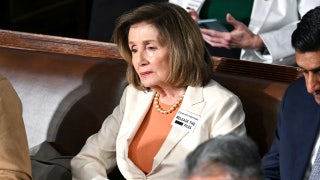Author and former researcher discusses dangers of 'woke capital'
Author Stephen Soukup joins 'Tucker Carlson Today' on Fox Nation
On the latest episode of Fox Nation's "Tucker Carlson Today," host Tucker Carlson welcomed author Stephen Soukup to discuss his book "The Dictatorship of Woke Capital" as well as his previous occupation working in a District of Columbia research office of a large brokerage firm.
Soukup said his job had been to offer analysis and recommendations to market traders and brokers based on his research and projections for how the federal government was behaving.
He then, however, recounted to Carlson an experience in which his nonpartisan analysis led to backlash from perceptively partisan brokerage leaders.
"What we did [at our firm] was try to figure out what's going to happen in Washington, and how it might affect equities markets, and to alert our clients as to what was going to happen based on developments in Washington and around the world," he said.
"I spent about four or five years at that big brokerage house, working for the guy who essentially invented the discipline of Washington research for Wall Street – and he was the biggest and best known Washington research analyst for all of Wall Street. People loved him. They called him Wall Street's ‘philosopher.’"
Soukup said that when he was working with that particular brokerage – in the latter part of the Clinton administration – he found political corruption to be the most alarming factor for potential market volatility in the near term.
He claimed that, behind the balancing of the budget between the cooperation of Sen. Trent Lott, R-Miss., Rep. Newt Gingrich, R-Ga., and President Clinton, which drove the headlines of the day, it was what was allegedly happening elsewhere that alarmed him.
Soukup said that then-Treasury Secretary Robert Rubin had been a chief force behind Clinton's 1995 decision to offer a $20 billion loan to Mexico to help the collapsing Peso, after Congress declined a $50 billion bailout, and criticized other events of the day.
"The United States, we argued, was on the verge of becoming a banana republic," he claimed. "The types of things that went on when Bob Rubin was Secretary of the Treasury, the types of things that went on while Bill Clinton was president-- the entire second term of his presidency was very dangerous, we thought, to the integrity of American business and the integrity of capital markets," he said.
"[T]here were a handful of things that bordered on corruption, and our admonition at the time was that we should be careful that getting politics too involved in finance, getting politics too deeply integrated into the capital markets, would eventually be a very serious issue."
Soukup said he relayed these fears to the aforementioned brokerage, but did not receive the response he expected.
The CEO of the firm, the author said, had been a close friend of Hillary and Bill Clinton, and therefore, he extrapolated, did not take the recommendations well.
"[H]e was unhappy with us calling them out. So our firm took the number one rated analyst, the guy who essentially created the category, and fired him two weeks before the 2000 presidential election," he said.
"It is a shocking story, but it goes to show you that they didn't care about what we were saying. They didn't care about research whatsoever. They didn't care about the truth. What they cared about was making the people that they thought were powerful happy."
He concluded by underlining that the primary consideration of capital market research should be the economy and not politics.










































